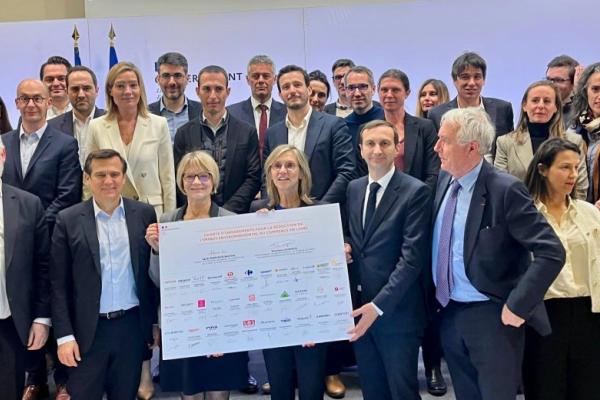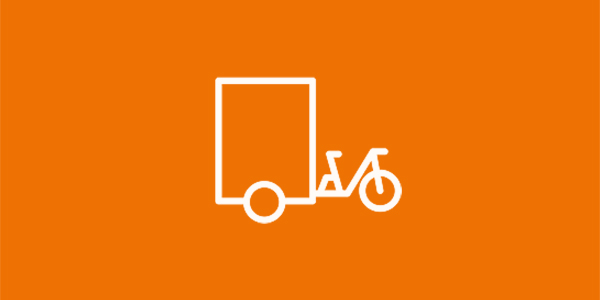Responsible e-commerce charter: Acting together for a more sustainable e-commerce
Born in 2021 at the initiative of the Ministry for Ecological Transition, in collaboration with FEVAD, the Responsible E-commerce Charter for reducing the environmental impact of online retail brings together e-commerce players around a common ambition: reducing the environmental impact of online sales, while promoting more sustainable, more responsible, more transparent logistics practices.

This voluntary and collaborative charter is based on a concrete commitment: transforming the entire e-commerce value chain, from order to delivery, including returns, packaging and consumer information.
5 key pillars for responsible e-commerce
To sustainably transform e-commerce practices, the charter is built on a concrete and shared methodology.
It structures commitments around 5 complementary pillars, covering the entire lifecycle of an online purchase, from product design to delivery, including returns, packaging, communication and logistics infrastructures.
A global and pragmatic approach, designed to guide every player towards a more sustainable, more transparent and more responsible e-commerce.

Better information is already taking action.
To allow consumers to make more responsible choices, the charter strengthens transparency in three key areas: the environmental impact of products, delivery methods and returns.
Signatories commit to making sustainable products (second-hand, eco-designed, local) visible, to clearly display the emissions linked to each delivery option, and to encourage best practices: grouped orders, limited returns.
The goal: to turn information into action, and make every consumer an informed player, driving the transition.

The last mile accounts for a significant part of emissions linked to e-commerce. To make it more sustainable, and even decarbonise it, the charter encourages the use of low-impact delivery methods: electric vehicles, cycle logistics, flow consolidation or optimised delivery rounds.
But optimising logistics also means better managing returns, which can represent up to a quarter of shipments. Signatories commit to preventing these returns through clearer product information, to track them rigorously, and to give value to returned products through reuse, donation or resale.
Reducing unnecessary kilometres and extending the product lifecycle: a dual lever to combine environmental impact reduction and logistics performance.

Often oversized, packaging remains a sensitive point of the customer experience and a key lever to reduce the environmental footprint of e-commerce.
The charter sets concrete objectives: limit void fill in parcels to 40% maximum, prioritise recycled, recyclable or reusable materials, and eliminate non-recyclable components.
Beyond waste reduction, this is also a strong message sent to customers: more sustainable packaging is a visible, immediate commitment that reinforces trust.

A credible CSR policy cannot be limited to surface measures. To be credible, it must be deployed at every level.
The charter invites companies to rethink their entire logistics ecosystem: warehouses, platforms, marketplaces and employees.
This includes certified buildings (HQE®, BREEAM®, LEED®…), optimised flows, and collective mobilisation of employees around shared objectives.
Marketplaces also have a key role to play in bringing their sellers together in this dynamic.
The aim: to make environmental performance a reflex embedded in all roles and activities.

Without transparency, there is no trust.
The charter commits signatories to regularly publish their results, rely on reliable indicators and adopt clear communication, without overpromising or greenwashing — the condition for credibility.
Every year, companies report on the progress of their commitments in a format readable by their customers, partners and stakeholders.
More than a reporting framework, this pillar makes the charter a genuine progress contract for our market, based on evidence and responsibility.
Consult the Charter of Commitments for Reducing the Environmental Impact of Online Commerce
Colissimo, a founding partner committed for the long term
For over 30 years, Colissimo has supported French e-retailers in their growth. A role as a historic partner that takes on its full meaning in the face of the environmental challenges of online commerce.
As a signatory of the first charter in 2021, Colissimo committed from the outset alongside the State, FEVAD and e-retailers.
This commitment is consistent with our climate trajectory launched in 2012, and reinforced in March 2025 by renewing our signature of the charter, with the same objective: to reach Net Zero Emissions by 2040 (validated by SBTi).
This commitment translates into concrete actions deployed at every link in the logistics chain: comprehensive, multimodal delivery offer; modernisation of transport; decarbonised delivery; energy optimisation of buildings; carbon footprint measurement tool; consumer information; best practices for packaging and reusable packaging… So many levers activated that make Colissimo a driving force for sustainable e-commerce in France.
A responsible e-commerce cannot be declared, it is built every day, together
For all e-retailers, whether SMEs or major platforms, Colissimo offers a collaboration based on transparency, evidence and co-construction. So that every parcel delivered respects our environment.
